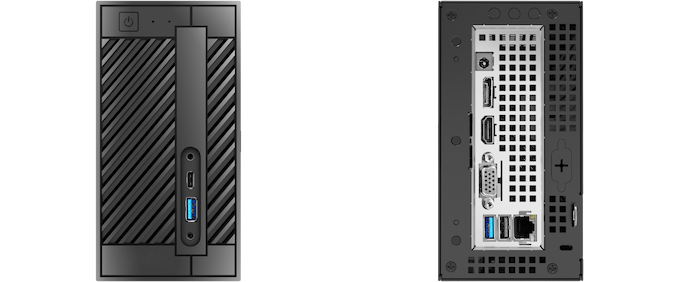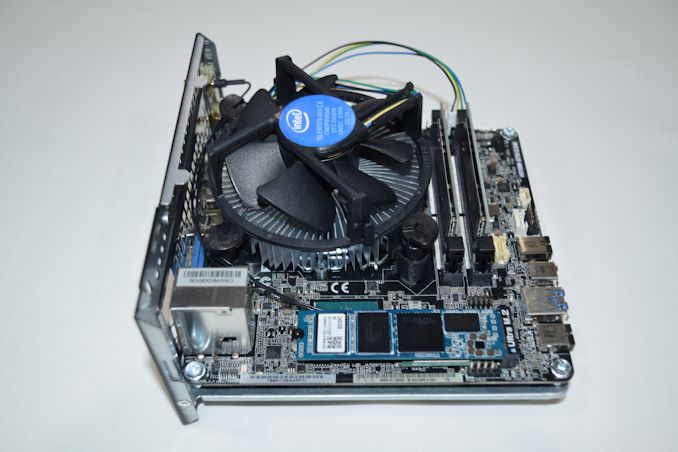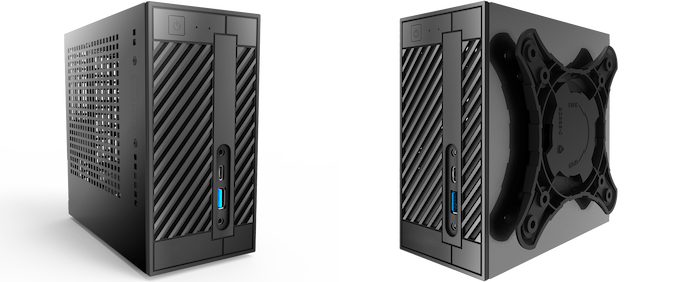The ASRock DeskMini 310 Mini-PC Review: A Cost-Effective Mini-STX Platform
by Ganesh T S on March 15, 2019 9:30 AM ESTConcluding Remarks
In this review, we were able to gather an idea of how the DeskMini 310 fares across a range of benchmarks. These cover most productivity workloads. However, two fairly important segments - gaming and performance for HTPC workloads - were not quantitatively investigated. The mini-STX form-factor is simply not amenable to the former, as the integrated GPU in the 8th and 9th Generation CPUs is not suitable for extensive gaming. For the latter, the focus on affordability has prevented ASRock from integrating a HDMI 2.0 port. The chassis is well-ventilated, but, the lack of any noise dampening means that the system is not as quiet as what one would expect from a HTPC. In any case, the Beebox series is more suitable for that market segment. The DeskMini 310 has its own target market in the business space, and it delivers a very cost-effective solution in that niche.
The mini-STX form-factor allows users to install powerful high-TDP processors in a compact, yet, flexible machine. While ASRock has premium machines with discrete GPUs in the micro-STX line (such as the DeskMini Z370 GTX), the main focus of the mini-STX suite is affordability. The H310 is a low-end chipset meant exactly for this market segment, and system vendors need to design the platform very carefully to get around its limitations. The enabling of the M.2 SSD slot with PCIe lanes directly from the CPU gets around the bandwidth constraints imposed by the PCIe 2.0 links in the H310 PCH.
It may be easy to provide ASRock with a list of needed improvements - say, a couple of USB 3.1 Gen 2 ports, or, even Thunderbolt 3. But, one also has to keep in mind that the DeskMini 310 is an entry-level product with the H310 PCH. Despite the usage of this low-end chipset, ASRock has delivered a fairly flexible barebones PC for just $162. Our only complaint about the price is that the DeskMini 110 with similar characteristics was introduced at $130 (and is still being sold in the channel at that price). In any case, the price includes the Wi-Fi module, chassis, and power supply also - aspects overlooked by DIY builders who may be able to source much cheaper mini-ITX boards. Assembling the DeskMini 310 is not as straightforward as the NUC. For example, mounting the Wi-Fi module and routing the antennae may be a time-consuming exercise for those unaccustomed to DIY builds.
ASRock's BIOS quality and feature set in the mini-PC space is perhaps surpassed only by Intel in their NUCs. The DeskMini 310 launched with support only for the 8th Gen processors from Intel. However, a BIOS updated issued last month now enables users to install 9th Gen CPUs in the unit. As mentioned earlier, the mini-STX platform appears to be geared towards long life-cycle products. So, it is satisfying to see ASRock continue to devote resources to entry-level products such as the DeskMini 310.













48 Comments
View All Comments
imaheadcase - Friday, March 15, 2019 - link
$523 (no OS). That is the problem with these type of things. It ends up being expensive that you could build own without investing in a SFF like that.At that price be better off getting a intel NUC
Alistair - Friday, March 15, 2019 - link
Basically Microsoft's monopoly and ridiculous Windows pricing (Microsoft just raised the price to $212 after tax in Canada, no freaking joke) can wreck any builder's day. Steal it or get a grey market $20 dollar copy from India. No remorse whatsoever. Who honestly thinks a price of $212 is warranted??? Government should have stepped in and limited the price to $50 a long time ago.Alistair - Friday, March 15, 2019 - link
Windows 10 Home OEM $212 after taxes:https://www.microsoft.com/en-ca/p/windows-10-home/...
Mr Perfect - Friday, March 15, 2019 - link
Oh, yeah, don't buy direct from MS. Newegg Canada has it for almost half that. https://www.newegg.ca/Operating-Systems/SubCategor...close - Friday, March 15, 2019 - link
Alistair, what's your day job? Because I'm entirely sure the government should have stepped in and limited your income to 25% of whatever you're making now a long time ago. Governments should do that you know...isthisavailable - Sunday, March 17, 2019 - link
Or just run insider preview builds in the slow ring for free?close - Monday, March 18, 2019 - link
No! It has to be stable. And free.Qasar - Sunday, March 17, 2019 - link
i agree... dont buy direct from microsoft... 2 comp stores here.. have win home 64 but for 140 cdn or less, even as low as 120 when on sale...Death666Angel - Friday, March 15, 2019 - link
I don't get it. This thing costs 150€ for a mainboard, case, PSU and WiFi. The cheapest 1151v2 ITX mainboard start at 75€, plus an ITX case with a PSU is another 50€ at least. So that is at least 125€ and no WiFi. It is also a helluvalot larger, but has better upgradeability. But you probably don't care about that, since you mention NUCs as a comparison.The cheapest current i3 (15W) NUC starts at (German prices) 260€. The DeskMini with a (much more powerful) i3-8100 (65W) costs 270€. And this thing actually can take a 6C/12T i7-8700. So it is not much more expensive, but definitely more versatile and powerful than a NUC.
Don't look at the "as configured" bit and compare it to what you would buy or bought a while ago. Ganesh uses the same things for everything for comparison sake and did not look for deals or what makes sense for the individual build. You can shave a lot of costs off by using M.2 SATA drives and other RAM for example. My config with brand new parts would be 420€ wtih 2x8GB DDR4, 500GB MX500 and a i3-8100.
sudhansu9dm - Friday, March 15, 2019 - link
Thanks for the reviewing this! I think this is a fantastic form factor held back by the use of older and nerfed chipsets.